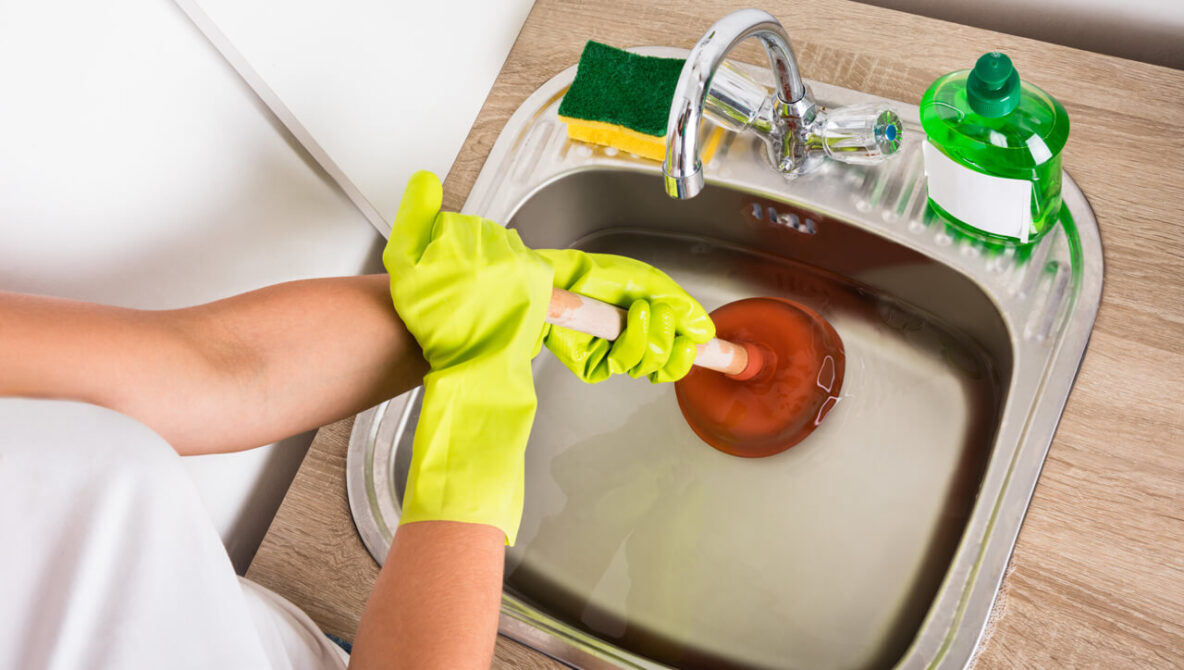The best way to avoid drain clogs is to be mindful of what you put in it. Instead of using harmful chemicals to clean your pipes, follow these simple tips to help keep your drains clear:
THE KITCHEN SINK WITH A GARBAGE DISPOSAL
Avoid tossing thick or sticky items into your kitchen sink. Food like thick fruit, vegetable peels, eggshells and pasta do not grind well and can cause a drain clog. Remember to toss your used coffee grounds or excess food scraps in the garbage or a compost pile rather than down your kitchen sink.
When using your garbage disposal, run a heavy stream of water down the drain, which will allow any waste material to run entirely through the drainage system. Clean your system out weekly by pouring boiling water down your most used drains.
FOR THE KITCHEN SINK WITHOUT A GARBAGE DISPOSAL
Never pour excess cooking grease in the garbage disposal or down the sink drain. Grease can stick to the inside walls of your pipes, leading to a drain clog. To prevent drain clogs, always dispose of grease directly into the trash can.
When you don’t have garbage disposal, a drain strainer will help prevent food scraps from trickling down the drain.
Once a week, pour boiling water down your drain to clean out the system, which will help melt away the weeks’ worth of grease that has accumulated inside your pipes.
THE BATHROOM
In your bathroom, it is best to use a screen or drain grate that covers the drain’s opening. A screen or drain grate will minimize the amount of hair and soap scum that accumulates in the shower and/or bathtub drain. Routinely clean these screens and grates to ensure that water doesn’t pool up due to all of the excess hair and scum on the screen.
In addition, always be mindful of what you flush down the toilet. Certain paper products like paper towels or baby wipes can easily cause clogging throughout your entire sewer and drain system.
UNIVERSAL SUGGESTIONS
Call Roto-Rooter of Traverse City Michigan to have a licensed plumber inspect your home’s plumbing system annually. Your service professional can snake all the drain lines in your home to remove any potential buildup before any severe clogging can occur. Depending upon how many people live in the house, your septic tank should be pumped every few years. If your home is attached to a municipal sewer system, your main sewer pipe should be cleaned periodically to prevent drain clogs. Older homes are more susceptible to clogs because they have sewer pipes that are made of clay, concrete or cast iron. Plastic pipes are less likely to experience root intrusion so they have fewer clogs.
Periodically, toss a handful of baking soda down the drain, followed by a stream of hot water. This combination will allow food particles to run down the drain and not stick to the side of the pipes. Baking soda also helps to absorb foul odors. You can also use vinegar to clean your sink, as it contain acetic acid, which helps in removing build-up. Pour 1 cup of vinegar down the drain and let it sit for about 30 minutes, then thoroughly rinse out the pipes by letting hot water stream down your sink.
Ultimately, to prevent drain clogs, do not treat your disposal, toilet, sink or shower like a dumpster. Pipes are narrow which means they are not meant to accommodate the size of every item you are attempting to flush. Always be mindful about what you’re tossing into your drain.


